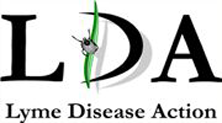This week (Thursday 22nd October), the House of Lords debated the topic of Lyme disease in the wake of much media attention following a range of celebrity* announcements on the relatively little-known and controversial infectious disease.
Lord Greaves, introducing the debate, asked the Minister, Lord Prior of Brampton, to follow up action points raised in a briefing by the UK charity Lyme Disease Action (LDA). Lord Greaves quoted from LDA’s briefing document: “The current level of knowledge in the NHS is appalling. Doctors do not understand the tests, the epidemiology or the disease itself.” He also quoted a patient who had been told by her GP that she “couldn’t have Lyme disease because she lived in London”.
LDA’s briefing was referred to by many of the peers who spoke. “The briefing by the Lyme Disease Action group was excellent”, said the Minister. “It was measured, well-informed and very constructive.”
The action points suggested by LDA were supported by all peers who spoke, many from personal experience. Lord Patel, whose wife (a keen gardener) had contracted Lyme disease, stated that “the key issues are prevention and heightened public awareness, along with the need for greater awareness among health workers”. This was a theme echoed by all speakers.
Also consistently highlighted were the complexity of the disease, the need for UK-focused guidance from the health authorities and the lack of awareness and experience of Lyme disease amongst the UK’s medical profession.
Baroness Wheeler suggested that the Help Desk run by LDA to support both doctors and patients could be used as a model to improve awareness of Lyme disease. Lord Luce suggested that “a regional service with specialist nurses and disease consultants could provide services and support for GPs in that region.”
It was acknowledged that recognising and treating the disease early was vital to prevent long-term consequences for patients and that GP awareness was the key. “That is, possibly, the most important thing we should be doing”, agreed the Minister.
The need to discover how many people are affected by the disease was emphasised by several peers; until the scale of the problem is known, the scale of appropriate action cannot be decided. There were calls to find out more about the issue of chronic Lyme disease from several peers, and Baroness Masham of Ilton asked the Minister whether research was taking place into the undoubted complications that can arise from late-treated disease.
The Minister, responding for the Government, said: “We recognise that Lyme disease is overwhelmingly the most important tick-borne infection in the UK, and we are aware that its incidence has risen several fold over the past couple of decades”.
Says Stella Huyshe-Shires, Chair of Lyme Disease Action: “We at LDA hope to continue working with the Department of Health, Public Health England and the wider NHS to improve the diagnosis and treatment of this complex disease. One very easy step could be taken immediately to improve early diagnosis: more doctors could take the half-hour online training module freely available from the Royal College of GPs.”
_____________________________________________________________________________________
*Celebrities who’ve recently announced that they have Lyme disease include Avril Lavigne (Canadian singer), Yolanda Foster (U.S reality TV star, plus her children aged 16 and 18), Richard Gere and UK billionaire John Caudwell, amongst others.
Ends/25th October, 2015
Note for Editors: See here LDA’s briefing, including basic information on Lyme disease/LDA’s five suggested action points.
Issued on behalf of Lyme Disease Action by press@nulllymediseaseaction.org.uk

 Printer Friendly
Printer Friendly